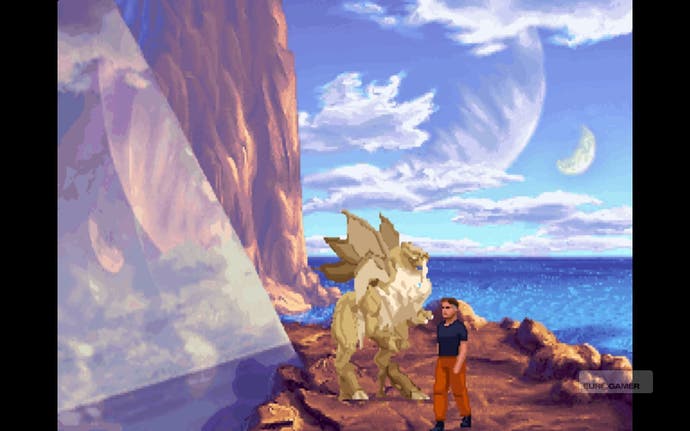Retrospective: The Dig
A world away.
Brink's early death is shocking. And random. It feels amazingly out of place in a game, to see a central character die so early, and without dramatic reason. He simply falls to his death through misfortune. Of course it also feels suspicious, as if you're being set up for something - surely someone so surprisingly likeable, if officious, can't be taken away from you like that?
And while of course Brink is soon alive again once you've applied the mysterious life crystal to his corpse, the reality is he was taken away from you like that. The reanimated Brink is not the same man, obsessed with the crystals, now a cruel and selfish danger to the other two.
Death in games is always problematic. When Tomb Raider IV ended with Lara's being crushed by a pyramid, what was clearly intended to be a shocking final moment was instead plain idiotic. You'd watched her die five thousand times before that point, and watching her die again just had you instinctively reach for the reload button, not weep with remorse. But adventure games, beyond the peculiar habits of some of Sierra's output, rarely killed you. LucasArts (beyond one famous exception) made sure never to cause you to die. So the loss of Brink, both times, and latterly Maggie's sacrificial death, are surprising moments.
There's two unfortunatelys to attach here. The first is the character reactions to the deaths. Low and Robbins start cracking wise while still standing either side of Brink's corpse. While there's a moment of grief, it doesn't seem to last until the end of the conversation, and then later you're awkwardly stepping over Brink's body as you busily solve the puzzles to reach the various tram points to continue through the game. At the end the reaction to Maggie's death, while cleverly pre-empted, again feels a little perfunctory.
The second unfortunately is far more significant, and it's where the brutal reality of having Spielberg's splendid imagination on board comes back to bite you in the bum. The rushed ending, as Low succeeds in the apparently almost impossible task of bringing the native creatures back from the alternate dimension to their own, by, er, walking through a portal, loses all gravitas when both Maggie and Brink are magically brought back from the dead without consequence.

It's such a great shame. The bleak, morose game, barren in both setting and hope, makes it so distinctive, so interesting. And then to have all the tragedy, all the cost, suddenly and inexplicably undone is a crucially bad decision. It's hard to imagine how much less happy a happy ending could make me.
But it's not what I've taken away. What I'm left with is the feeling of isolation, the ambient loneliness, and most of all, of a sense of the potential for gaming to slowly, carefully tell a story.
The Dig's story may eventually crumble away into a schmaltzy irrelevant ending (that then doesn't connect to the opening sequences in any meaningful way), but it bulges with potential. Where Solaris successfully and movingly explores the nature of isolation and identity, and the imprecise - perhaps even meaningless - nature of memory, The Dig ultimately fails to take any of its themes to enough depth. But despite this it still stimulates similar feelings of separation and loneliness. The ambient score and gorgeous hand-painted backdrops (the wonky CGI moments and odd cel-shaded cut-scenes don't fit neatly amongst them, but are never offputting) are moodily evocative. It's a fascinating game, serious and mysterious, and stunningly well performed.
